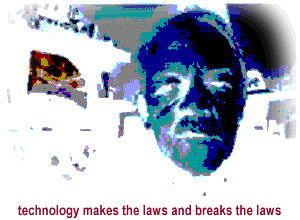
Standing out among the yachts and fishing boats moored to a west-end Vancouver dock is a curiously shaped houseboat that looks like nothing so much as the front end of a Boeing 747. Inside, it is as warm and homey as a country cottage, stuffed with soft, mismatched couches, warm rugs, plants, exotic artifacts from Fiji and Haiti, and hundreds of thousand of dollars worth of computers, faxes, modems, televisions, video recorders, and other high-tech toys. This electronics-packed floating cottage is the home of 75-year-old Frank Ogden, a self-styled futurist better known as "Dr. Tomorrow". Perched on a comfy recliner with his keyboard in his lap, this aging cybernaut surfs the future, collecting global intelligence about emerging technologies via satellite television dish, shortwave radio, news wire, and the Internet. A news feed pumps data directly into one of his computers, ceaselessy spewing out information from around the world -- information that not only keeps Ogden up to date on the latest gee-whiz technological breakthroughs, but enables him to predict the direction the future will take. |
 |
We live in a world where "expert" advice has become crucial to our well-being, without which we are unable to make the simplest decisions. In part it's a symptom of information overload -- there is simply too much raw information swirling through the datasphere for any single individual to absorb -- and in part it is the result of the misguided worship of technopoly and the acolytes who serve it. Expert guidance is now available on everything from finding a mate to getting a job, and few of us dare make a move without first hearing what the experts have to say. |
Or so he would have us believe. Ogden's pronouncements are treated as gospel by corporate CEOs and talk show hosts. Pulling in more than $450,000 a year from books, speaking engagements, newspaper columns, and radio shows, Ogden has turned the future into a thriving business. From Nairobi to Nagoya, Dr. Tomorrow is the globe's foremost practitioner of the art of future-telling -- and even at $7500 per speaking engagement, corporations and organizations are lining up to hear him speak. He is one of a growing number of self-proclaimed prophets whose words grow ever more potent in our future-shocked society. Carelessly repeated by impressionable journalists, academics, politicians, and advertisers, these words take on the force of fact, when really they are nothing more than propoganda and rhetoric. In fact, more often than not, what these people have to say about the future is either blatantly false or intellectually flawed. And yet, as Max Dublin writes in Futurehype: The Tyranny of Prophecy, "Predicting the future has become so integral to the fabric of modern consciousness, that few people feel compelled to question it." Wrapping itself in technological hyperbole and the worn out jargon of economics, futurism takes its cue from the pseudo sciences -- the so-called social sciences -- turning trend-watching into analysis and self-serving statistics into emprical proof. |
All this, in spite of the obviously banal conclusions of the sociologists whose statistics and experiments blithely confirm what common sense told us long ago, or the economists, whose "dismal science" is so woefully and consistently inaccurate that it is a wonder we give them any more respect than we do astrologers. Former US President Ronald Reagan is mocked for his reliance on astrology, but few criticize the voodoo economics he foisted on a hapless nation -- except other economists.
As for the future, we're probably better off relying on the predictions of science fiction than on the futurists. Futurism is about trends, about extrapolation. It is about as reliable as Jeanne Dixon. We would do as well to read the entrails of goats as to try and understand the future by looking at the trends of today. In almost every case, futurism predicts a continuation of the thing that is happening.
And that is not what the future is going to be. As Hannah Arendt so eloquently put it in On Violence, "only in a world where nothing of importance ever happens could the futurologist's dream come true. Predictions of the future are never anything but projections of present automatic processes, that is, of occurrences that are likely to come to pass if men do not act and if nothing unexpected happens."
Over the past ten years a lot has happened that no futurist could have ever predicted -- most notably, the collapse of the Soviet Union. Shackled to the logic of superficial trends, few were able to discern the signs of decay and corruption eating away at the foundations of the Soviet empire. The most accurate prediction came not from the futurists, but from an obscure French political scientist named Helene Carrere d'Encausse, whose 1978 book, Decline of an Empire, laid bare the myth of a monolithic Soviet bloc, accurately identifying the factors that were already beginning to pull the Soviet Union apart.
And who, for that matter, other than William Gibson, could have predicted the meteoric rise of the Internet?
Even as recently as five years ago, the Internet remained an arcane realm inhabited by technophiles and academics, its applications limited to discussion groups and email.

